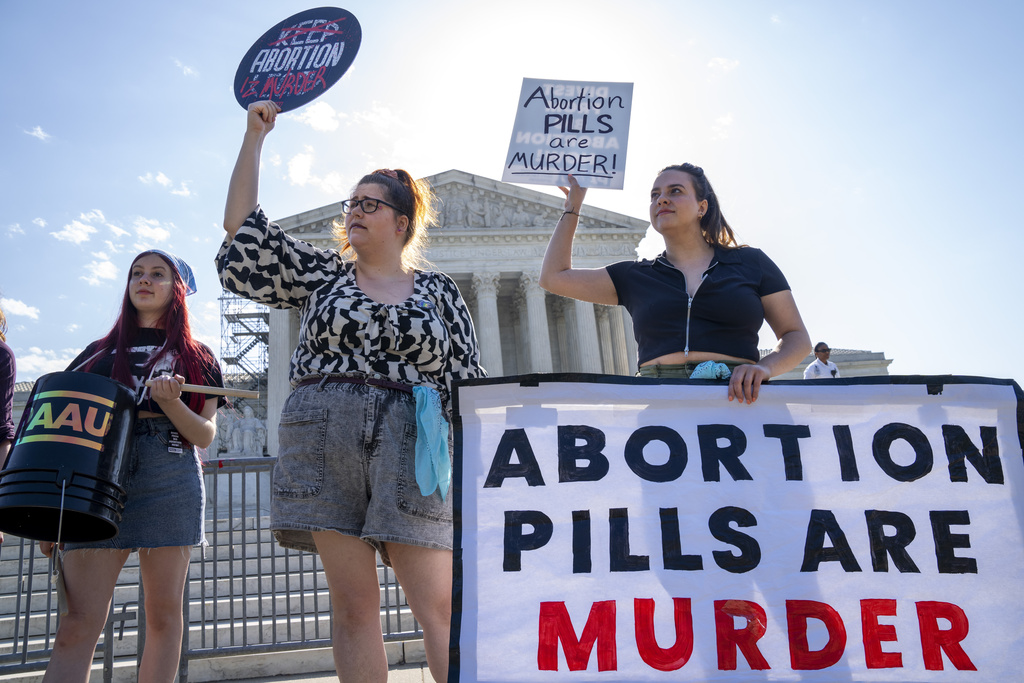A judge on Tuesday sentenced activist Lauren Handy to four years and nine months in prison for leading a blockade at an abortion clinic in Washington, D.C., in 2020.
Handy, 30, was convicted by a jury last year of two charges, conspiracy against rights and a Freedom of Access to Clinic Entrances Act violation, after she and nine others organized and attended what they described as a “rescue” at the clinic. The incident involved using chains, bike locks, and ropes to block the clinic entrance.
The Justice Department had asked Judge Colleen Kollar-Kotelly to sentence Handy to 6.5 years, saying in a sentencing memorandum that Handy and one of her co-defendants were the two “masterminds who chose the clinic, advertised the event, recruited participants, and planned the crime.” The FACE Act has been around for decades, but the Biden Justice Department has significantly increased prosecutions under the statute.
Handy’s attorneys asked for a one-year sentence, saying Handy intended to lead a peaceful event that involved an “attempt to rescue preborn children from imminent death at the hands of an abortionist who Ms. Handy believed performed illegal late-term procedures.”
Prosecutors noted that the protest was not entirely peaceful as some of the co-defendants pushed their way into the clinic entrance, causing employees to fall to the ground, including a nurse who sprained her ankle. A few of the participants chained themselves together and used chairs to block the clinic entrance for hours until they were arrested.
Kollar-Kotelly observed how Handy’s actions prevented multiple clinic patients from entering the facility.
“Your views took precedence over, frankly, their human needs,” Kollar-Kotelly said.

Handy, who had been in prison for nine months while she awaited her sentencing, has a long history of protesting at abortion clinics. She took matters a step further in 2022 when police discovered she had the remains of five aborted fetuses in her apartment. Handy was never prosecuted for the incident, but her supporters spread graphic visuals of the deformed fetuses on social media.
One of Handy’s attorneys, Martin Cannon of the Thomas More Society, told the Washington Examiner that Handy had retrieved the fetuses from outside the clinic she blocked two years prior. Dr. Cesare Santangelo ran the clinic at the time that Handy obtained the fetuses. Cannon indicated that Handy took such drastic measures to block the clinic entrance because of who the doctor was.
“Because it’s Santangelo. Santangelo changes everything because of what he does. Have you ever seen the pictures?” Cannon said of the photos of the fetuses.
The advocacy group Live Action once recorded Santangelo during an undercover operation saying he “would not help” a baby in the rare event the baby was born alive during a late-term abortion procedure.
One woman named Maggie Venditti traveled from Ohio to support Handy and her co-defendants during their sentencing hearings.
Venditti, who was holding one of the photos of the fetuses, told the Washington Examiner that while Kollar-Kotelly seemed “very reasonable,” the judge disregarded violence against the unborn.
“That judge seemed very reasonable. She seemed very fair, but what’s ignored is — they talk about violence, but look at the violence,” Venditti said, pointing to the photo in her hand.
“She’s coming across, like, ‘Yes, you can have all your beliefs you want, but you stop at the line of violence, and I want to say, ‘Hello?’ It’s like there’s something missing. … There’s a lack of the spirit of good,” Venditti said.
CLICK HERE TO READ MORE FROM THE WASHINGTON EXAMINER
The incident involving the fetal remains was not used as evidence in Handy’s abortion clinic case.
One of Handy’s co-defendants pleaded guilty to a FACE Act charge and received 10 months in prison. The remaining were convicted in trials and are all set to be sentenced this month.
